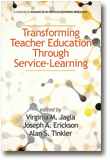
Transforming Teacher Education through Service-Learning
Edited by:
Virginia M. Jagla, National Louis University
Joseph A. Erickson, Augsburg College
Alan S. Tinkler, Missouri State University
A volume in the series: Advances in Service-Learning Research. Editor(s): Alan S. Tinkler, Missouri State University. Todd A. Price, National Louis University.
Published 2013
Transforming Teacher Education through Service-Learning provides a fresh look at educational reform through the lens of teacher preparation. It poses the question “Why service-learning now?” as it discusses the meaningful ways service-learning pedagogy can transform the approaches used to prepare teachers to educate tomorrow’s children.
The pedagogy of service-learning has significant implications for teacher education. Its transformative aspects have far reaching potential to address teacher candidate dispositions and provide deeper understanding of diversity. Knowledge of the pedagogy and how to implement it in candidates’ future classrooms could alter education to a more powerful experience of democracy in action and enhance the civic mission of schools. The current and ongoing research found within this volume is meant to continue support of the notion of educational reform.
Because the vision we hold becomes the reality we experience, it is imperative to consider the question—Why service-learning now?—as we adjust teacher preparation programs to promote engaging opportunities for today’s youth.
CONTENTS
Acknowledgements. Foreword. Preface: Why Service-Learning Now? Part I: Conceptual Frameworks, Virginia M. Jagla. Tensions as Catalysts for Transformation: Multidisciplinary Education Faculty Perceptions While Implementing Service-Learning, Vera Stenhouse, Caitlin McMunn Dooley, and Joseph Feinberg. Teacher Education as Partnership: Service-Learning and the Audacity of Listening, George L. Boggs. Critical Discourse Analysis of Service-Learning Perspectives and Models: Transforming Teacher Education, Antonia Lukenchuk, Virginia M. Jagla, and Todd A. Price. Part II: Field Experiences: Providing the Space for Deeper Understanding, Alan S.Tinkler. Toward Understanding Effective Community Field Experiences, Kathleen Tice and Larry Nelson. Teaching Across the Community: Using Service-Learning Field Experiences to Develop Culturally and Linguistically Responsive Teachers, Alan Tinkler and Barri Tinkler. Part III: Preservice Teachers Learn Through Tutoring, Joseph A. Erickson. Impact of Service-Learning in an Undergraduate Middle School Principles and Practices Class, Nancy Ruppert. Latino/a Preservice Teachers and Community Service-Learning: Justice Embraced, Dodged, and Troubled, Kathleen Bussert-Webb. Walking the Walk and Showing How: University Students Learning to Lead through Service, Elizabeth Barber, Tom Smith, Sharon Jacobs, Karen Thompson, Blayre C. Penn, Bethany S. Penn, Carl B. Redd, Destenie Nock, Brianna Cooke, Brittany McLean, Donald R. Thompson, and Ahmod Camp. Toward a Better Understanding: A 360-Degree Assessment of a Service-Learning Program in Teacher Education Using Stufflebeam’s CIPP Model, Guilli Zhang, Christine Shea, Nancy Zeller, Robin Griffith, Debbie Metcalf, Jennifer Williams, and Katherine Misulis. Part IV: The Pedagogy of Service-Learning for Implementation in P–12 classrooms, Virginia M. Jagla. TeacherCorps: Transforming Teacher Education Through Social Justice, Service-Learning, and Community Partnerships, Marjori Krebs, Kiran Katira, Swechha Singh, and Neil Rigsbee. Final Reflection: The Vision We Hold. About the Editors.
-
Paperback9781623964184
Web price: $45.04 (Reg. 52.99)
-
Hardcover9781623964191
Web price: $80.74 (Reg. 94.99)
- eBook9781623964207

- EDU000000 - EDUCATION: General
- EDU029000 - EDUCATION: TEACHING METHODS & MATERIALS: General
- EDU037000 - EDUCATION: Research
-
 Educating Teachers and Tomorrow’s Students through Service-Learning Pedagogy
Educating Teachers and Tomorrow’s Students through Service-Learning Pedagogy
-
 Pursuit of Liberation
Critical Service-Learning as Capacity Building for Historicized, Humanizing, and Embodied Action
Pursuit of Liberation
Critical Service-Learning as Capacity Building for Historicized, Humanizing, and Embodied Action
-
 Service-Learning Pedagogy
How Does It Measure Up?
Service-Learning Pedagogy
How Does It Measure Up?
-
 Service-Learning to Advance Access & Success
Bridging Institutional and Community Capacity
Service-Learning to Advance Access & Success
Bridging Institutional and Community Capacity
-
 Service‐Learning to Advance Social Justice in a Time of Radical Inequality
Service‐Learning to Advance Social Justice in a Time of Radical Inequality
-
 Taking eService-Learning to the Next Level
Models and Tools for Next Generation Implementation
Taking eService-Learning to the Next Level
Models and Tools for Next Generation Implementation
-
 Understanding Service-Learning and Community Engagement
Crossing Boundaries through Research
Understanding Service-Learning and Community Engagement
Crossing Boundaries through Research

